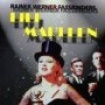Angst essen Seele auf
| 片名: | Angst essen Seele auf |
|---|---|
| 其它片名: | 恐惧吞噬心灵/恐惧蚀人生 |
| 导演: | Rainer Werner Fassbinder |
| 编剧: | Rainer Werner Fassbinder |
| 制片人: | Rainer Werner Fassbinder |
| 摄影: | Jürgen Jürges |
| 声音: | Fritz Müller-Scherz |
| 剪辑: | Thea Eymèsz |
| 主演: | Barbara Valentin, Brigitte Mira, El Hedi ben Salem |
| 片长: | 93分钟 |
| 年份: | 1973年 |
| 类型: | 剧情 |
| 国别: | 德国 |
| 语言: | 德语 |
| 格式: | |
| 制作机构: | Filmverlag der Autoren |
影片概述 . . . . . .
60岁的清洁女工埃米因为避雨,在酒吧认识了10岁的摩洛哥人阿里,两人在众人的怂恿下跳了舞,最后阿里又送埃米回家,两人在埃米的家里相互诉说各自的寂寞,话多夜短,阿里错过了末班车,留宿在埃米家里。第二天醒来,埃米感到不安,阿里安慰她说恐惧会吞噬心灵。一个外籍工人在埃米家留宿的事很快在邻居间传开,人们都议论纷纷,房东的儿子也借交房租的事指责她,埃米不得以谎称阿里是她未婚夫。以后两人交往日密,最后两人真的结了婚。婚后儿女们、邻居们、埃米的同事们几乎所有的人都指责他们,食品店也不再买东西给她,他们唯一的交往是阿里酒吧的朋友。埃米感到很难堪,于是跟阿里一块去旅游,希望回来后情况会好转。回来后,情况果然好转。原因是儿女和邻居需要她的帮助,她的同事需要她一起对付新从南斯拉夫来的清洁女工,食品店生意不好争顾客,人们因种种原因容忍了他们。但这时,阿里受不了社会的歧视又和吧女芭芭拉重归于好,埃米找到阿里,两人在第一次相遇的酒吧相拥跳舞时,两人又感到了幸福。阿里突然感到不适,蜷伏在地,医生诊断是患有严重的胃溃疡,是因为外籍工人面临压力、紧张的生活和充满敌意的环境造成的。
这个故事是对社会的一种批判,揭示了人物的身份、年龄的差异、社会的歧视与误解、命运的捉弄是造成悲剧的本源。导演对德国各阶层的关注、对各类问题的洞察,其视野和深度不同凡响。题材取自于法斯宾德心仪的好莱坞前辈道格拉斯·瑟克50年代名作《天堂可以等待》。
Rainer Werner Fassbinder's quietly powerful film is a sort-of remake of Douglas Sirk's "All That Heaven Allows," a film and director greatly admired by Fassbinder, but it has a sharper edge than Sirk's film. In "Ali: Fear Eats the Soul," the couple fighting a society's prejudice and resentment of their unconventional love must fight some of their own prejudices as well. In Sirk's film, the only thing imposing on the complete happiness of Jane Wyman and Rock Hudson was the busy-body ostracism of family and friends who didn't approve of the relationship between a rich society widow and her working-class gardener. In "Ali," Fassbinder suggests that happiness isn't something that's gained from the approval of others, but rather is the responsibility of the individuals involved. One of the things I liked best about this film is that as the German society gets used to the unconventional romance and begins to accept our two protagonists, the couple themselves begin to struggle to maintain a grip on the happiness they thought would be their's by right.
Fassbinder's unconventional couple are a frumpy German widow and a Moroccan immigrant 10-15 years younger than her. I gather from this film that Moroccans (or Arabs in general) were about as hated and feared in Germany at the time of this film's release as blacks were in America during the worst of the civil rights movement. So you can imagine how the couple's initial courting and subsequent marriage is handled by their neighbors, friends and family. Fassbinder himself was gay, and many suggest that the film is an allegory for the way homosexuals were persecuted. Fassbinder's private life undoubtedly informed his film, but the movie is really more universal than that. It really applies to anyone who's ever suffered the judgement of a group of people over something that didn't even affect those people, and really, who can honestly say that they've never been subjected to that?
Fassbinder directs in a low-key, unfussy style, yet he creates images and scenes that linger in the head long after the film is over. It's a lovely film, very well acted, scripted and directed. It's not exactly sad, because it argues that societies are able eventually to adapt to new things and accept things they originally rejected. But it's not exactly happy either, because it suggests that relationships don't necessarily become easier just because external obstacles are removed
这个故事是对社会的一种批判,揭示了人物的身份、年龄的差异、社会的歧视与误解、命运的捉弄是造成悲剧的本源。导演对德国各阶层的关注、对各类问题的洞察,其视野和深度不同凡响。题材取自于法斯宾德心仪的好莱坞前辈道格拉斯·瑟克50年代名作《天堂可以等待》。
Rainer Werner Fassbinder's quietly powerful film is a sort-of remake of Douglas Sirk's "All That Heaven Allows," a film and director greatly admired by Fassbinder, but it has a sharper edge than Sirk's film. In "Ali: Fear Eats the Soul," the couple fighting a society's prejudice and resentment of their unconventional love must fight some of their own prejudices as well. In Sirk's film, the only thing imposing on the complete happiness of Jane Wyman and Rock Hudson was the busy-body ostracism of family and friends who didn't approve of the relationship between a rich society widow and her working-class gardener. In "Ali," Fassbinder suggests that happiness isn't something that's gained from the approval of others, but rather is the responsibility of the individuals involved. One of the things I liked best about this film is that as the German society gets used to the unconventional romance and begins to accept our two protagonists, the couple themselves begin to struggle to maintain a grip on the happiness they thought would be their's by right.
Fassbinder's unconventional couple are a frumpy German widow and a Moroccan immigrant 10-15 years younger than her. I gather from this film that Moroccans (or Arabs in general) were about as hated and feared in Germany at the time of this film's release as blacks were in America during the worst of the civil rights movement. So you can imagine how the couple's initial courting and subsequent marriage is handled by their neighbors, friends and family. Fassbinder himself was gay, and many suggest that the film is an allegory for the way homosexuals were persecuted. Fassbinder's private life undoubtedly informed his film, but the movie is really more universal than that. It really applies to anyone who's ever suffered the judgement of a group of people over something that didn't even affect those people, and really, who can honestly say that they've never been subjected to that?
Fassbinder directs in a low-key, unfussy style, yet he creates images and scenes that linger in the head long after the film is over. It's a lovely film, very well acted, scripted and directed. It's not exactly sad, because it argues that societies are able eventually to adapt to new things and accept things they originally rejected. But it's not exactly happy either, because it suggests that relationships don't necessarily become easier just because external obstacles are removed
导演阐述 . . . . . .
获得奖项 . . . . . .
评论列表(0) . . . . . . ( 发表新评论 ) ( 更多评论 )
幕后花絮 . . . . . . (上传花絮) (展开所有)
影片图集 . . . . . . (更多/我要上传)
相关视频 . . . . . . (更多/我要分享)
对本影片资料作出贡献的会员 . . . . . .
4444(创建者)



















































